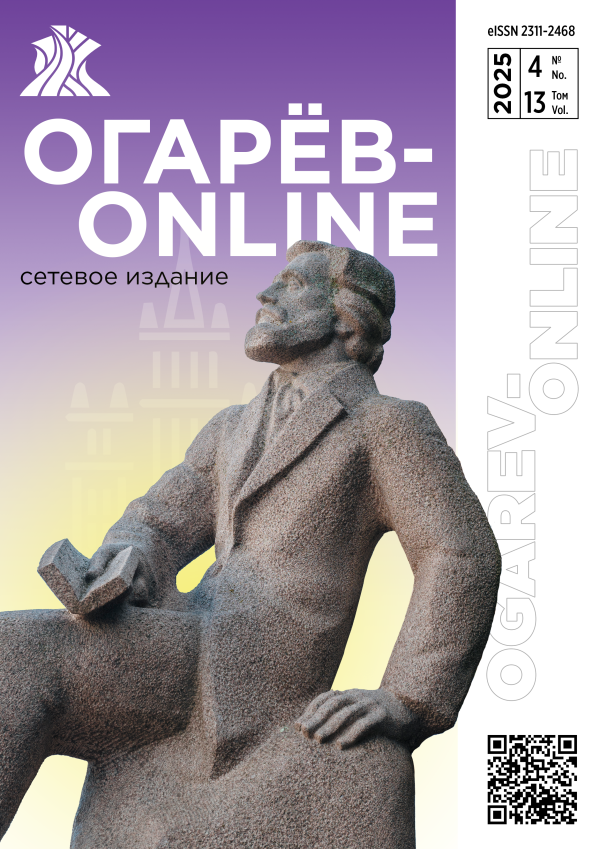Vol 12, No 16 (2024)
- Year: 2024
- Published: 21.12.2024
- Articles: 10
- URL: https://ogarev-online.ru/2311-2468/issue/view/18174
Full Issue
Communication skills of lawyer in resolving land disputes
Abstract
The article is devoted to the analysis of the communication skills of a lawyer necessary for resolving land disputes and conditioned by the specifics of the corresponding category of legal disputes. Land disputes are a complex category of legal cases, including a set of successive stages of interaction between the parties to the dispute with the participation of state bodies, experts and specialists. Effective resolution of land conflicts in practice is impossible without a professional experienced lawyer with a set of certain communication skills.
 2-7
2-7


Public and legal foundations of digital biomedicine
Abstract
The article addresses the major problems of legal regulation in the field of digital biomedicine. The author considers a number of legal aspects of the functioning of the brain-computer interface technology. In addition, the author studies the features of legal regulation of 3D bioprinting, which has become widespread in the present time.
 8-14
8-14


Legal expertise of legal acts and documents
Abstract
The article reveals the concept and essence of legal expertise of legal acts and documents. It is noted that legal expertise has a complex character and combines the research of documents in different areas of legal regulation. The main goal of legal expertise is to avoid errors and mistakes in legal documents that can lead to violations of the law and negative effects for either party. At the same time, legal expertise is aimed at identifying and eliminating discrepancies between legal documents, which is vital for providing unity of legal regulation.
 15-19
15-19


The concept and characteristics of real estate as item of taxation
Abstract
The article considers the concept and characteristics of real estate, the criteria for classifying various items of real estate in accordance with the reform of Russian civil legislation. The analysis is based on theoretical provisions and materials of judicial practice. In addition, problems of legal regulation of real estate are identified and solutions for improving the current civil legislation of the Russian Federation are proposed.
 20-25
20-25


Part of land plot as target of vindicatory lawsuit
Abstract
The article examines the possibility of vindication of a part (parts) of a land plot. The study of law enforcement practice and doctrine revealed problems in the legislative regulation of these legal relations. The authors propose to eliminate the existing legal uncertainty by amending Article 301 of the Civil Code of the Russian Federation.
 26-31
26-31


Using artificial intelligence in teaching students: legal aspect
Abstract
The article considers the use of artificial intelligence in education as the issue of studying its educational potential for the development of students is extremely relevant. A conclusion is made that artificial intelligence opens up many prospects for the development of students' intelligence, but at the same time requires in-depth scientific research in order to determine the rational limits and procedure for its application.
 32-40
32-40


Issues of building trust as legal category within the commonwealth of independent states
Abstract
The article is devoted to the role of trust as legal category in the process of building political relations between Russia and the CIS member states. Recognizing transparency, openness, predictability as the key foundations of mutual trust, the authors note the special significance of the practice of joint participation in solving the internal problems of the Commonwealth countries.
 41-45
41-45


Current issues of qualification of the crime covered by article 272 of the criminal code of the Russian federation
Abstract
The article outlines the problems that arise in practice when qualifying unauthorized access to computer information. The authors indicate the reasons that determine typical errors in qualifying the act in question and offer options for the correct application of criminal law norms.
 46-53
46-53


Revealing and exposure of false testimony in crime investigation
Abstract
This article analyzes logical, psychological, tactical methods that allow an investigator to identify lies in the testimony of suspects, accused, victims, witnesses and expose dishonest interrogated persons in order to successfully solve and investigate crimes. In this connection, a number of factors play an important role, such as the correct understanding of the essence of lies by the investigator, knowledge of its varieties and typical signs, an idea of the process of giving false testimony.
 54-62
54-62


Poisonous substances as means of crime: methodological basis of criminalistic study
Abstract
Poisonous substances can be used as a means of committing a number of crimes related to infringement on human life and health. The author considers poisonous substances as a special object of study in criminalistics, which is a source of important information, a factual basis for putting forward investigative versions and determining the directions of investigation of crimes. In addition, a certain specificity of actions on the use of these substances for criminal purposes is noted. A characteristic "trace picture" formed by them is described, which requires the elaboration and implementation of special forensic techniques and methods.
 63-69
63-69

















